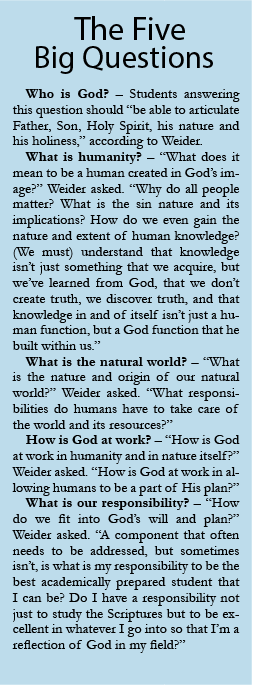Knowledge in Christ

Dr. Ronald Hawkins starts new committee to help professors guide students
“Who is God?”
Liberty University has created a new committee to help students be better prepared to answer big questions such as this that they will encounter after graduation.

Learning — Teachers encouraged students to answer big spiritual questions in class. Photo credit: Ty Hester
Liberty Provost Dr. Ronald Hawkins feared that new graduates would walk away from Liberty with a degree and a wealth of knowledge in their chosen profession but not have the knowledge to articulate some of the important questions surrounding their faith.
From this desire stemmed the idea to start a committee where faculty members would gather together to discuss some of the big questions in life that students should be able to answer and articulate in a biblical worldview perspective.
“Rather than being legalistic or taking some true or false, multiple choice or matching tests their senior year in order to answer what they believe about God, Dr. Hawkins wanted them through classes or a capstone course (to be able know) the biblical responses to key questions (framed within the context of their particular major),” Liberty School of Divinity professor Lew Weider said.
Weider, who is the chair of the committee, along with other committee members including Dr. Emily Heady, Dr. Mark Allen, Anthony Thornhill, Kevin Conner, Dr. Ed Martin, Dr. Fernando Garzon, Esther Aleindor, Brad Burgess and Dr. Melanie Hicks, came up with five “big questions” for which students should be able to give a well-thought-out biblical answer.
The five questions are “Who is God?,” “What is humanity?,” “What is the natural world?,” “How is God at work?,” and “What is our responsibility?”
In addition to students answering these questions, Hawkins felt it was of great importance to have faculty members address these questions. This way, faculty members could lead by example. This semester, Hawkins and the committee led a faculty forum. During the forum, members of the committee took turns answering the questions from the perspective of their particular field of study.
“How do I as a faculty member reflect my savior by the way I treat my students, the way I talk about my colleagues, my authority, my community, my children and my wife?” Weider asked. “How do I put it all in proper perspective? Do I reflect Christ in the way I teach (and) the way I communicate by email and Facebook? Is it consistent?”
According to Weider, students take courses such as biblical worldview, philosophy, Old Testament survey, New Testament and theology during their freshman and sophomore year where they learn how to answer these questions, but due to the nature of the education, students do not remember all the information.
The committee will serve as a way to dive deeper into these questions and give both students and faculty a better understanding of them.
“I believe the goal of the provost is to create a dialogue within departments — for faculty to dialogue within their departments, in their major and within their courses — to implement this concept, these big questions into a capstone or key course they could provide assessment,” Weider said.
BUNNER is a news reporter.

